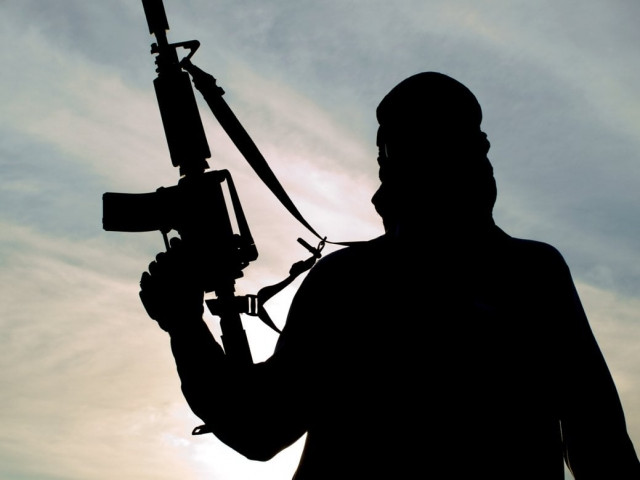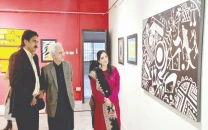Afghan leaders stir up tensions with Pakistan over border issues
President Karzai, ministers seek foreign intervention over alleged cross-border attacks.

The Pakistan Army says it has lost several soldiers over the past few days in firing from Afghan soil by Pakistani Taliban fighters. PHOTO: FILE
Karzai and his ministers have discredited the established bilateral diplomatic channels to discuss and lessen border tensions, preferring to take up the issue with other countries. However, they could not garner any third-party support.

Afghan lawmakers oppose the involvement of other countries in Pak-Afghan bilateral matters, especially border disputes and insist such a move could further complicate the situation.
“It is an issue between the two countries and their governments; members of parliament and tribal elders on both sides of the border should resolve bilateral matters rather than seeking foreign intervention,” Afghan Senator Arif Pashtoon told The Express Tribune from Kabul via telephone on Friday.
The comments came following Karzai’s team’s attempt to seek help from the US and its Western allies against Pakistan. On May 29, President Hamid Karzai personally raised the issue of what he claimed “Pakistani artillery and rocket shelling” with the top American commander in Afghanistan, General Joseph F Dunford.
A statement issued from Karzai’s office, quoted General Dunford telling the Afghan president that he (Dunford) is unaware of the “rocket attacks” and the Afghan “media exaggerate” while reporting the issue.
On Tuesday, Afghan Defence Minister Bismillah Muhammadi told the press on the sidelines of the Nato defence ministers’ meeting that the alleged Pakistan shelling was “flagrant aggression on Afghan territory”. He said President Karzai has issued orders to Afghan forces to respond to the attacks.
A few days later, the Afghan Foreign Ministry in a letter sought US support against Pakistan’s ‘rocket attacks’ recalling that “the US is bound to help Kabul to counter external threats” under the 2012 Strategic Partnership Agreement.
In response, a senior US diplomat in Kabul declared that Washington will remain neutral and advised the Afghan government to resolve border disputes with Pakistan through diplomatic channels.
This week, US ambassador to Afghanistan James Cunningham told reporters in Kabul, “Both countries have different views about what is happening on the border. It seems to me that the best way to deal with this is for security and diplomatic leaders of both countries to be talking to each other.”
Toeing the official line, Afghan media has also been critical of Pakistan in recent strong-worded editorial comments over the border tension.
The country’s media – both state-run and private – not only adopted an aggressive stance towards Pakistan but has even suggested military action against the neighbouring country.
The state-run newspaper, Hewad, has termed the alleged Pakistani shelling ‘intolerable’ and called for a ‘strong reaction’. In an editorial published on June 1, the daily wrote, “Pakistan’s incursion should be stopped as soon as possible and they should be given a jaw-breaking response.”
The privately-run newspaper, Arman-e Melli, insists the Afghan side must take action over the alleged Pakistani rocket attacks.
“Afghans cannot accept the situation. It is unclear as to why our foreign allies, and those who have signed security pacts, are tight-lipped and are not taking any measures,” the paper published in a recent editorial.
However, the Pakistan Army says it has lost several soldiers over the past few days in firing from Afghan soil by Pakistani Taliban fighters who, security officials say, now operate from the Afghan border region.
After fleeing the 2009 military operation in Swat valley of Pakistan, Mullah Fazlullah emerged in a video and disclosed that he had reached Afghanistan.
In April, during an informal sitting with Afghan Interior Minister Omer Daudzai at his Kabul office, the minister did not deny the presence of Mullah Fazlullah in Afghanistan and instead answered vaguely.
“If the Afghan Taliban chief Mullah Omar is in Pakistan, then Mullah Fazlullah would be in Afghanistan but if Mullah Omar is not in Pakistan then Mullah Fazlullah is also not in Afghanistan,” Daudzai told The Express Tribune, when he was questioned about statements from Pakistani officials.
Published in The Express Tribune, June 7th, 2014.



















COMMENTS
Comments are moderated and generally will be posted if they are on-topic and not abusive.
For more information, please see our Comments FAQ